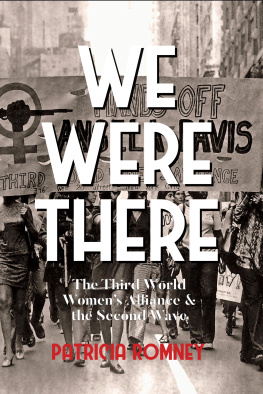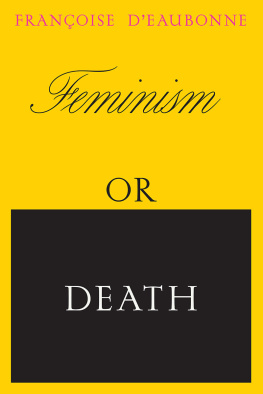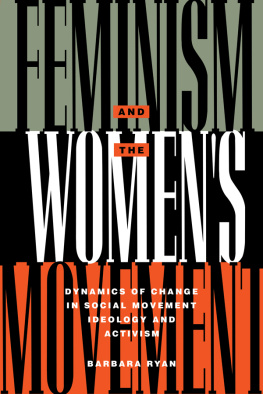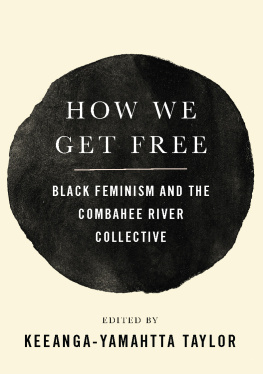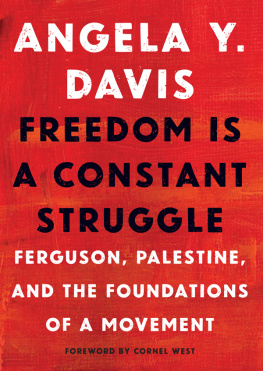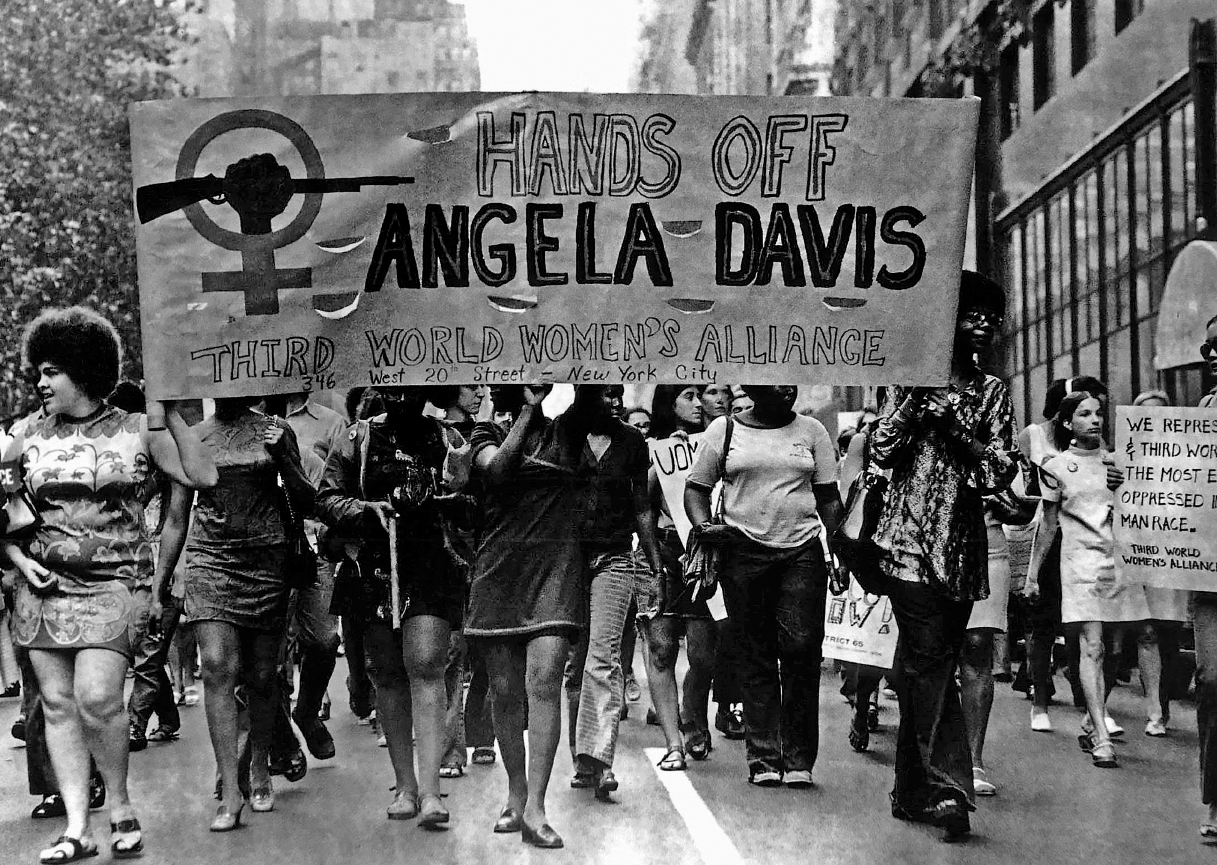Contents
Page List
Guide
Advance praise for We Were There: The Third World Womens Alliance and the Second Wave
Fifty years ago, the Third World Womens Alliance passionately insisted on interconnections among racism, sexism, and capitalism, inspiring radical analytical frameworks and organizing strategies associated with contemporary conceptions of feminism. We are deeply indebted to Patricia Romney for helping to generate a record of the Alliances pioneering contributions and thus for ensuring that its revolutionary legacies live on.
ANGELA Y. DAVIS, author of Freedom Is a Constant Struggle: Ferguson, Palestine, and the Foundations of a Movement
In the 1970s, with the mimeograph as weapon, and in solidarity with international liberation struggles, US women of color turned to one another, across ethnic and racial divides, to recognize their common cause. We Were There is the origin story weve been waiting for. Those radical sister foremothers shaped for themselves an utterly prescient (if not always perfect) politicone to which the tenets of This Bridge Called My Back, intersectionality, and transnational feminism remain beholden. Yes, they were there, as Patricia Romney, living witness and researcher, fervently attests. And we are so grateful that they were.
CHERRE MORAGA, coeditor of This Bridge Called My Back: Writings by Radical Women of Color
With a narrative that is both engaging and inspiring, Romneys We Were There gives us an important insiders view of the Third World Womens Alliance and the powerful sisterhood that transformed the lives of so many women. Now more than ever, we need the voices of women of color activists who were fighting against racism, sexism, and classism in the 1970s to speak across generations and share their lessons learned. The struggle continues!
BEVERLY DANIEL TATUM, author of Why Are All the Black Kids Sitting Together in the Cafeteria?: And Other Conversations about Race
In We Were There, Sistah Pat has created a riveting collective memory and critique of the TWWAs radical contributions to our enduring movement for justice and liberation.
MELANIE TERVALON, physician, educator, and activist
For those who were there, Romneys book rings true with passion, remembrance, and wisdom. For those who were not there, it is a history lesson rooted in honesty, commitment, and the vision of a more just future. From historical artifacts to interviews and portraits of former members, this book includes broad-based examples of solidarity and inspiring personal and collective stories. We Were There is a call to action about frequently hidden or denied lessons of the past that we would do well to remember today.
SONIA NIETO, professor emerita, University of Massachusetts Amherst
We Were There brilliantly makes visible and salient the complex and intersectional stories of the 1970s womens movement that have so often been whitewashed and omitted in many educational contexts. This book is a heartfelt and compassionate scholarly exploration of coalition building, education, and activism, centering the work and stories of women of color. Dr. Romney is a gifted storyteller and talented scholar who offers insight and wisdom that helps us, as readers, to better understand contemporary social justice work.
MARCELLA RUNELL HALL, coeditor of UnCommon Bonds: Women Reflect on Race and Friendship
WE WERE THERE
The Third World Womens Alliance & the Second Wave
PATRICIA ROMNEY
FOREWORD BY FARAH AMEEN
Published in 2021 by the Feminist Press
at the City University of New York
The Graduate Center
365 Fifth Avenue, Suite 5406
New York, NY 10016
feministpress.org
First Feminist Press edition 2021
Copyright 2021 by Patricia Romney
Foreword copyright 2021 by Farah Ameen
All rights reserved.

| This book was made possible thanks to a grant from New York State Council on the Arts with the support of Governor Andrew M. Cuomo and the New York State Legislature. |
No part of this book may be reproduced, used, or stored in any information retrieval system or transmitted in any form or by any means, electronic, mechanical, photocopying, recording, or otherwise, without prior written permission from the Feminist Press at the City University of New York, except in the case of brief quotations embodied in critical articles and reviews.
First printing October 2021
Cover photograph, Hands Off Angela Davis, by Luis C. Garza
Cover design by Sukruti Anah Staneley
Text design by Frances Ross
Library of Congress Cataloging-in-Publication Data
Names: Romney, Patricia, 1944- author. | Feminist Press.
Title: We were there : the third world womens alliance and the second wave / Patricia Romney ; foreword by Farah Ameen.
Description: New York, NY : Feminist Press, 2021. | Includes bibliographical references.
Identifiers: LCCN 2021031109 (print) | LCCN 2021031110 (ebook) | ISBN 9781952177828 (paperback) | ISBN 9781952177835 (ebook)
Subjects: LCSH: WomenHistory20th century. | FeminismHistory20th century. | African American womenHistory20th century. | African American womenSocial conditions20th century.
Classification: LCC HQ1154 .R73 2021 (print) | LCC HQ1154 (ebook) | DDC 305.4209/04dc23
LC record available at https://lccn.loc.gov/2021031109
LC ebook record available at https://lccn.loc.gov/2021031110
PRINTED IN THE UNITED STATES OF AMERICA
For Frances Beal, whose politics, vision, and intellect made the Third World Womens Alliance a reality and without whom there would be no story to tell.
For all the sisters of the Third World Womens Alliance who dedicated themselves to making the world a more just place for women of color, our families, and our communities. And for our brothers who supported us in that work.
For AmFam, my crew of sisters and brothers from the Pioneer Valleyprogressive faculty members, teachers, administrators, and social justice consultantsin gratitude for your friendship and your ongoing work for justice.
Contents
by Farah Ameen
Foreword
WHEN PATRICIA ROMNEY first approached me about working on her book We Were There: The Third World Womens Alliance and the Second Wave, I expected it to be about a womens movement in third world countries. Im Bangladeshi AmericanI grew up in India, and then lived in Bangladesh for a couple years before I came to the United States as a graduate student in 1991. While Id never heard the term third world used in reference to American women, I soon learned that for Pats organization, the Third World Womens Alliance (TWWA), this internationalist language provided radical insight into the struggles of women of color in the US, and how they could build solidarity.
Rooted in the civil rights movement, the TWWA was a bicoastal group active from 1970 to 1980. They advocated for women of color specifically, because they faced what the TWWA termed a triple jeopardy of race, gender, and class oppression. They wanted the womens movement to address issues such as the forced sterilization of women of color, unsafe abortions, infant mortality rates, inequality in wages, and the need for welfare rights. They also questioned sexism in activist organizations.

